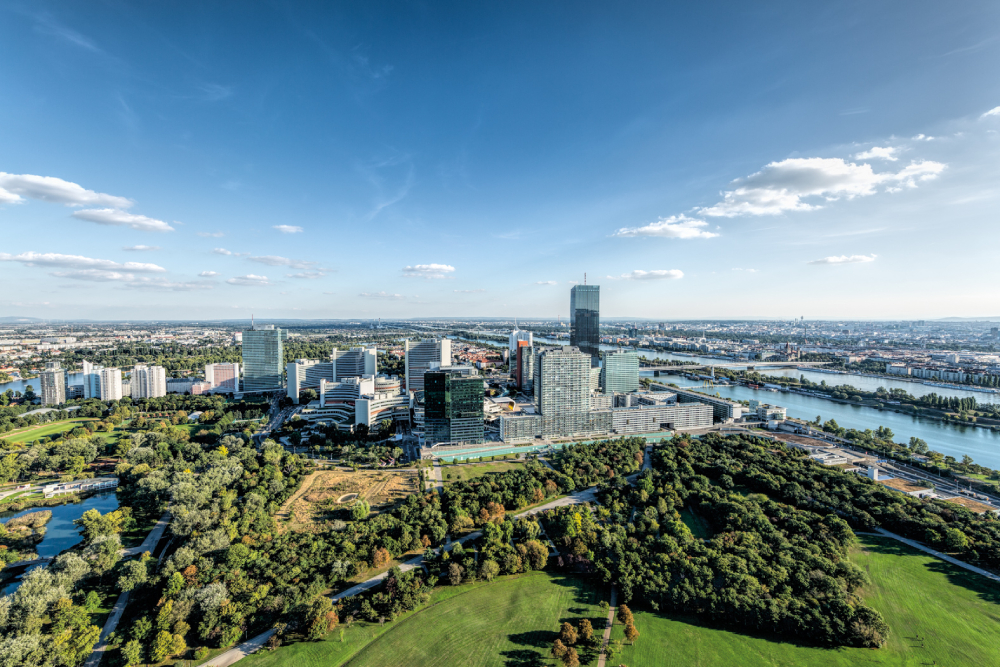Outlook for 2024
A Talk with Anthony Crow

Will 2024 Mark the Year of
Optimizing Existing Property Portfolios?
Is the year likely to focus more on revitalizing and redeveloping properties and projects instead of new developments? Anthony Crow, our Head of Commercial Property Marketing, has been asked by Die Presse to provide insights on the current situation in the commercial real estate market.
Anthony Crow: The optimization of existing properties is becoming more crucial. The market is shifting toward sustainable and resource-saving initiatives for existing buildings, such as brownfield developments in the industrial and logistics sectors. Projects that improve existing structures, like the repurposing of industrial and logistics spaces, are becoming more important. There is an increasing awareness of sustainability, efficiency, and adaptability, both from developers and users. This has led to a clear trend of sustainably utilizing and upgrading existing properties.
What repurposing trends are emerging? Office into hotel? Or office into residential?
The conversion of office space into hotels is an increasingly visible international trend. Similarly, converting offices into residential units can be a practical solution in certain cases to meet the demand for urban housing. However, it’s clear that features like ceiling heights and floor depths of office spaces are not always ideal for residential purposes.
These projects are inherently complex and require detailed planning to address challenges such as building regulations, zoning designations, fire safety, soundproofing, and zoning requirements. From our perspective, careful planning is key to the success of such conversions.
The Vienna office market remains robust, with low vacancy rates and strong demand, limiting the potential for repurposing. However, we are seeing rising demand for alternative usage concepts in less central locations. In the retail asset class, for example, we are observing increased demand for offices or hospitality uses in ground-floor zones, formerly dominated by traditional retail, especially in Vienna’s B and C locations.
Which type of conversion is financially viable? And which is viable from an ecological perspective?
Financial and environmental profitability is largely determined by factors like location, market conditions, and demand. Mixed-use projects that combine residential and commercial spaces in well-connected locations (the 15-minute city concept) are proving to be economically attractive.
From an ecological perspective, projects that prioritize sustainability make sense. Although this is not yet fully reflected in financing models, we expect this to shift soon. Conversions that focus on energy efficiency, renewable energy integration, or smart building technologies are increasingly contributing to ecological profitability. Certifications can help to support these initiatives.
Are department stores still relevant today? How can their use be optimized?
Department stores face the challenge of maintaining their relevance in urban centers. Multifunctional concepts and adapting to changing consumer habits could optimize their usage, for example by integrating leisure facilities, coworking spaces, or converting them into mixed-use residential and commercial areas. It is clear that new impulses are needed here. A sustainable approach and aligning with current trends are crucial for their future.
How are the utilization cycles of commercial real estate evolving?
Commercial property usage cycles are undergoing continuous change. There is a clear trend toward flexibility, a growing emphasis on sustainability, and the increasing integration of technology. New work models, online commerce, and the need for sustainable buildings are influencing developments in the office, industrial, logistics, and retail sectors. Adaptability and innovative use concepts are essential to meet evolving requirements.
Who takes over "distressed" commercial real estate projects? How can unfinished buildings be repurposed?
Investors with experience in redevelopment are often interested in such projects, attracted by the prospect of a low-cost acquisition, but primarily by the potential for value appreciation. The repurposing of unfinished buildings into residential units, offices, or alternative usage concepts opens up opportunities for revitalization and market adaptation. We observe a trend towards an attractive and cohesive mix of living, working, shopping, and leisure—a combination that can meet the needs of the local residential and working population. In our experience, a thorough legal and structural review, followed by strategic planning tailored to local requirements, is essential for the success of such projects.
Are you looking for the perfect commercial property for your business?

